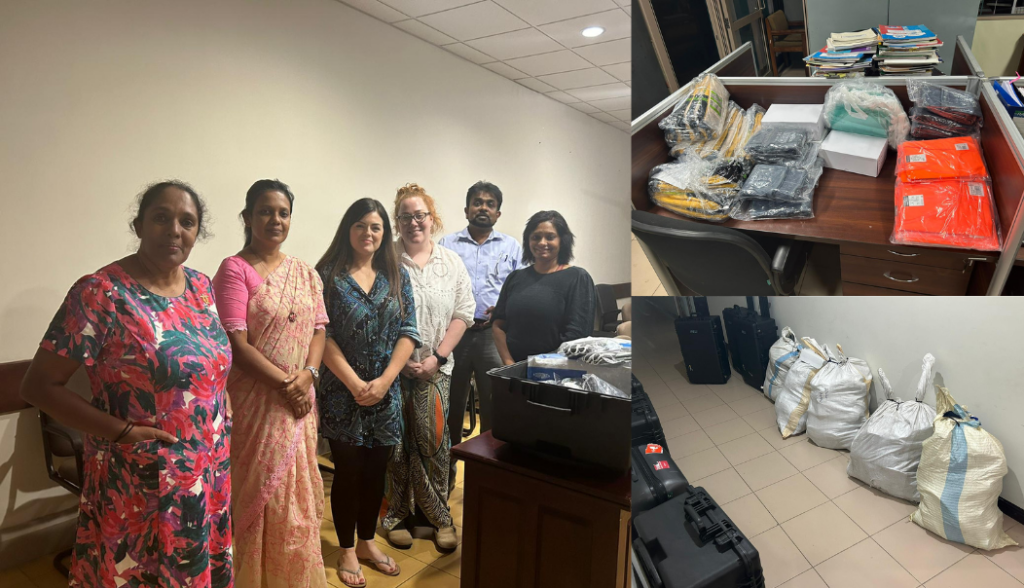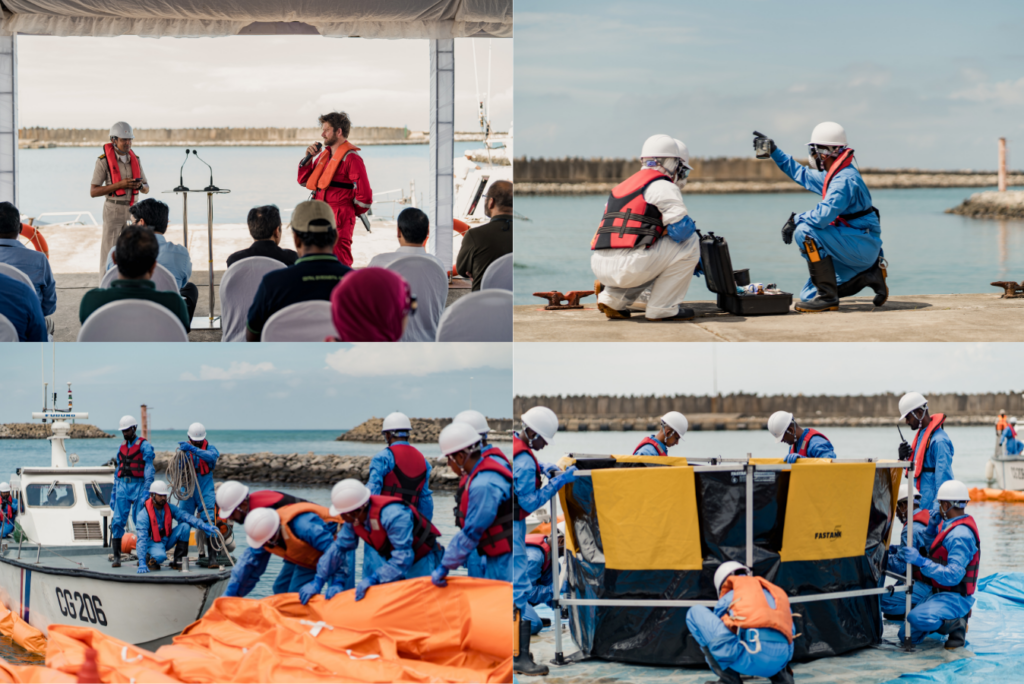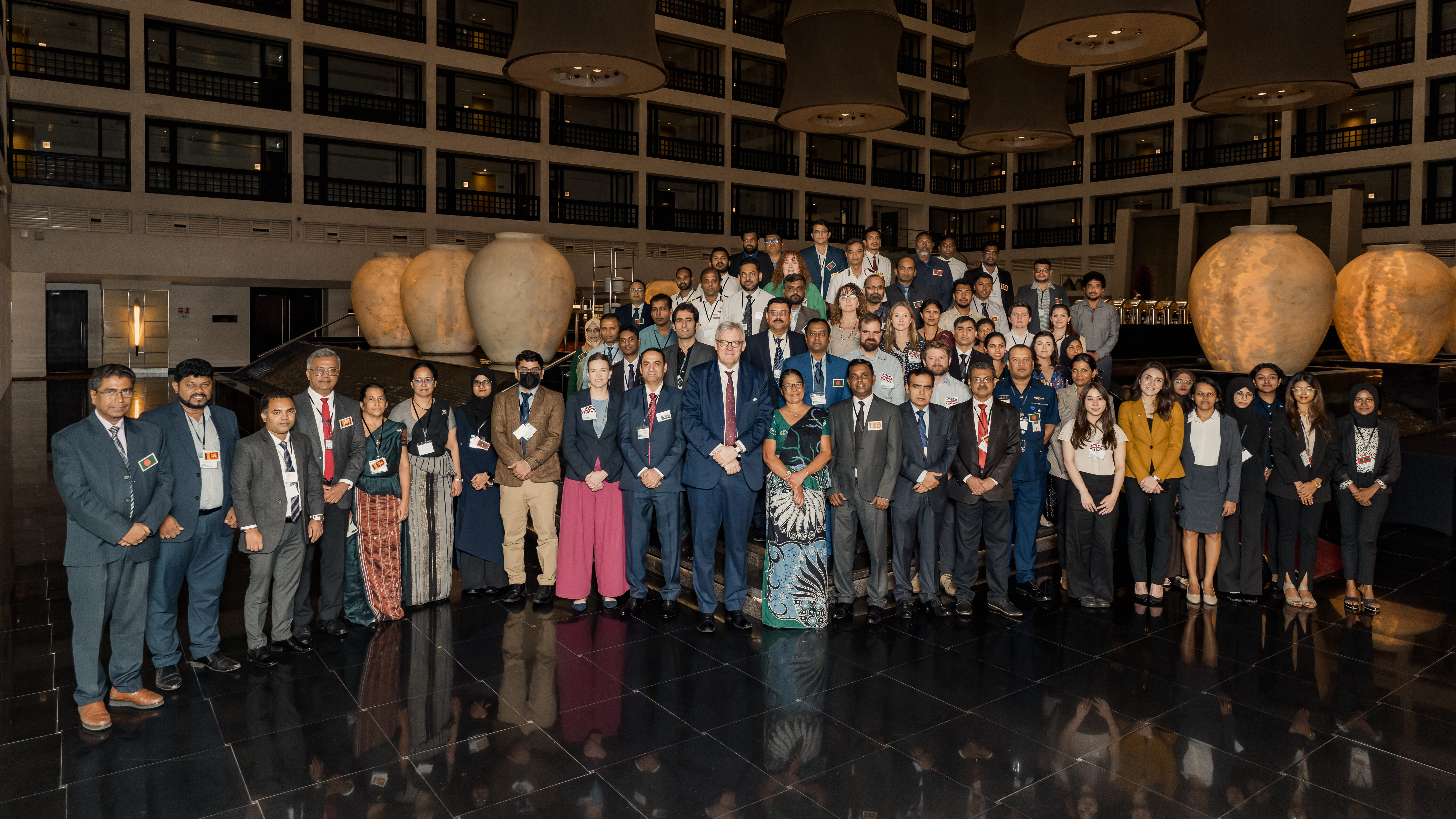Authors: Angharad Elliman, Freya Goodsir, Todd Last
From November 12th to 22nd, 2024, the Ocean Country Partnership Programme (OCPP) teams from Cefas and JNCC, embarked on a technical visit to Sri Lanka. This visit was part of a broader effort to address marine pollution, enhance response readiness, and foster regional cooperation. Spanning two weeks, the visit was packed with discussions, capacity-building workshops, and hands-on exercises, all culminating in the South Asia Co-operative Environment Programme (SACEP) Symposium.
OCPP is a UK Government-led official development assistance (ODA) programme under the Blue Planet Fund, delivered by the Centre for Environment, Fisheries and Aquaculture Science (Cefas), the Joint Nature Conservation Committee (JNCC) and the Marine Management Organisation (MMO) on behalf of the UK Department for Environment, Food and Rural Affairs (Defra).

SACEP Symposium emergency response tabletop exercise
Week 1: Laying the Groundwork for Sri Lanka’s Marine Environment
The first week focused on advancing Sri Lanka’s State of Marine Environment Report (SOMER) - a critical tool for assessing the health of the nation’s marine ecosystems and identifying priorities for future action.
Stakeholder Workshops and Collaborative Planning
In Colombo, the OCPP team, in collaboration with the Marine Environment Protection Authority (MEPA), hosted a series of targeted workshops to finalise the SOMER. Key stakeholders gathered to refine the report, which provides a coordinated review of Sri Lanka’s marine environment, covering themes such as pollution, biodiversity, fisheries, and climate change. Built on national expertise and global insights, the SOMER highlights key areas of concern and recommends future actions aligned with Sri Lanka’s National Environment Plan.
The workshops also focused on drafting a long-term monitoring plan to improve marine health assessment mechanisms. A roadmap will be submitted to MEPA by March 2024, outlining best practice options to use key indicators to track environmental changes and ensure sustainable marine management.
To finalise the report, the feedback from over 30 technical experts will be integrated by the end of November, with the draft submitted for final review in December. Once completed, the SOMER will be translated into two languages and shared with MEPA and all technical partners by January 2024.
By establishing a robust assessment and monitoring framework, these efforts are helping to secure a healthier, more sustainable future for Sri Lanka’s marine environment.

Left to right: State of Marine Environment Report (SOMER) Meeting, Handover of Oiled Wildlife Equipment to the Department of wildlife and Conservation.
Building Capacity for Oiled Wildlife Response
Another significant milestone was the official handover of personal protective equipment (PPE) for oiled wildlife response to the Department of Wildlife Conservation. This donation equips 70 responders across Sri Lanka with essential tools to tackle oil spills and protect marine life.
This initiative builds on a detailed Oiled Wildlife Response Contingency Plan developed earlier with OCPP and forms part of ongoing efforts to enhance collaborative preparedness. Training for 30 frontline responders is scheduled for February 2024, ensuring Sri Lanka is better prepared for future emergencies.
Week 2: Strengthening Regional Collaboration at the SACEP Symposium
The second week focused on regional collaboration during the SACEP Symposium 2024 in Colombo. Representatives from South Asian countries gathered to share updates, address challenges like limited resources and training, and explore ways to collaboratively enhance marine pollution response across the region.
Presentations from organisations like ITOPF (International Tanker Owners Pollution Federation Limited) introduced global best practices, such as regional agreements and shared response frameworks, while discussions emphasised leadership, peacetime readiness, and lessons from incidents like the X-Press Pearl pollution event. Technical sessions on dispersant use, liability, and waste management helped highlight areas to strengthen future emergency response capabilities.

SACEP Symposium Expert presentations and key Contingency Plan review session
A gap analysis of the Regional Contingency Plan (RCP) identified key improvements, including regular training, shared resources, and a sustainable funding model. Participants developed a roadmap for refining the plan and strengthening regional preparedness.
The week concluded with a practical deployment exercise at Dikkowita Fisheries Harbour, where attendees observed equipment demonstrations and learned from real-world pollution responses. The symposium reinforced the need for a united regional approach, setting the stage for stronger collaboration and readiness across South Asia.

SACEP Symposium Day 5 Emergency Response Equipment Deployment and Nurdle Warehouse Visit
A Stronger Future for Marine Conservation
The Sri Lanka technical visit and SACEP Symposium highlighted the power of collaboration in tackling complex environmental challenges. From capacity-building workshops to hands-on exercises, the two-week initiative laid the groundwork for stronger marine pollution response systems, both nationally and regionally.
You can watch the video highlights here: https://youtu.be/RuqCE6Jtvb8
Media Spotlight
The symposium received widespread media coverage, showcasing Sri Lanka’s leadership in marine pollution response. Articles in prominent outlets such as The Morning and Daily News emphasised the significance of the event. Interviews with OCPP representatives and Sri Lankan officials further highlighted the importance of regional cooperation in addressing marine emergencies.
A special feature on the symposium was aired on AdaDerana news on December 14th, 2024, offering further insights into the week’s achievements.
Through collaboration, technical expertise, and shared learning, Sri Lanka and its regional partners are taking bold steps toward safeguarding the oceans for generations to come. The outcomes of this visit reaffirms the importance of unity in tackling marine pollution and ensuring sustainable marine management.

- Sri Lanka better equipped to address future marine disasters - experts
- Sri Lanka improves readiness for marine pollution disasters after shipwreck incidents - LNW Lanka News Web
- Marine Pollution: SACEP & UK team up for capacity building | The Morning
- SACEP symposium concluded in Colombo | The Morning
- Ocean Pollution: A Sound regional architecture vital for emergency response | The Morning
- South Asia Co-operative Environment Programme Symposium - DailyNews
- Lanka leads the way in strengthening marine pollution response post ‘X-Press Pearl’ and ‘New Diamond’ disasters – The Island